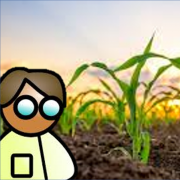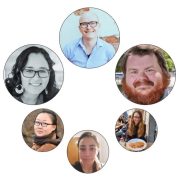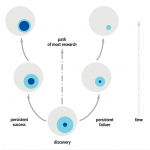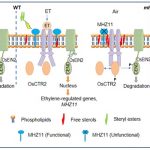Informational Interview with Dr. A Peyton Smith, Assistant Professor at Texas A&M University
Informational Interview by Aya Bridgeland, ASPB Conviron Scholar
Dr. A. Peyton Smith is an Assistant Professor in the Department of Soil and Crop Sciences at Texas A&M University. Dr. Smith studies soil organic matter and microbiome characterization and how they interact with soil physical properties to impact the flux of soil carbon. She is originally from Madison, Wisconsin, and received her master’s degree from the Yale School of Forestry and Environmental Studies and her PhD in Soil Science from the University of Wisconsin – Madison.
Can you speak on how you decided to pursue a career in the sciences?
I don’t have a very linear path to science, or being a professor and an academic. The first university I went to was Purdue University for aviation. I got my pilot’s license in high school. I had gotten into flying because of a Society of Women Engineers program that had an essay contest, and I chose to write about Sally Ride, who was the first American woman to go into orbit. When I was reading about her career, I thought, “astrophysics is amazing!”, and like most American children I wanted to be an astronaut. I got into Purdue, but after a year of taking college-level science classes, I realized that there was so much more than just flying…so, I quit.
What happened then? How did you decide where to go from there?
After Purdue, I moved to Seattle, Washington, and studied Forest Ecology at the University of Washington because I was enchanted by the forests and the landscapes there. In one class I heard the word “mycorrhizae”, and just the notion that there are these symbiotic organisms that interact with plant roots really blew my mind, and I wanted to study more about it. I decided I should get a master’s degree after my undergrad and working in a mycorrhizae lab in New Delhi, India, and I ended up going to the Yale School of Forestry and Environmental Studies. I realized that all the questions I was asking, especially about how trees and plants translocate nutrients, how the light environment plays a role in that…I felt like the soil held all the answers. Key processes were occurring in the soil that could be describing that we were seeing above ground. I decided to get a PhD in soils. There were very few soil departments in the country, so I ended up going to the University of Wisconsin – Madison.
What were your experiences like during your PhD in Soil Science?
My PhD really focused on the intersection between biogeochemistry and microbial ecology. Especially with our changing climate, I was interested in soil organic matter and the mechanisms that can keep carbon stable in the soil, even up to a decade. My adviser for my PhD was phenomenal; she was the perfect fit for me. For our lab meetings, we incorporated professional development activities, like reviewing our CVs, coming up with our own hypotheses, or meeting guest scientists, and it was a great climate. Even throughout my postdoc and my current position [as an assistant professor], she still mentors me. More research is showing that mentorship is what keeps women and people of color in the sciences and making sure that they stay. One of the reasons I knew I wanted to become a professor was to create this kind of climate for other people.
I’ve heard you speak previously about the Wisconsin Idea. Can you explain what it is and discuss how this philosophy has impacted your career or academic path?
I grew up in Madison, Wisconsin, but I left for about ten years before I returned for my PhD. You’re always aware of the university presence in that city. My father worked for the University as staff, and he was such a big proponent of education and the Wisconsin Idea.
In some ways the Wisconsin Idea is the same thing that all land grant institutions should encompass. The whole point is to build up our knowledge, that knowledge should be available, and it should be used to make sure that the people in this state can use that knowledge. At Wisconsin, almost everyone in the College of Agriculture and Life Sciences has an extension component to their work. So they need to get out there and provide something to the community. I really like that. I think having that idea – that what you do is for the good of all – you can see that thread through people’s work.
What is it like to start out as an Assistant Professor? What does your job involve?
Everything. I am expected to play so many different roles. Because I had watched my PhD adviser build a lab from scratch and be so successful, I thought “Oh, I got this figured out. I can do this”. Then, I got here and I realized there was so much going on behind the scenes. In addition to trying to start my lab up and recruit students, I also need to mold my current students into top notch scientists, and make sure to do it in a healthy way. Graduate school is very demanding. I don’t believe that you can mentor a student to be an amazing scientist if you do not address work-life balance or their mental health. I had done a lot of mentoring during my PhD and postdoc and had won a peer mentoring award, so I had this notion that I knew what went into it. But I got here, and it surprised me how much I was not prepared and it has been a challenge. I am not a trained therapist! But I take mentoring seriously and it takes a lot of time and thought and energy.
Was there anything that surprised you about starting a professorship?
I prepare for big life changes. I am very intentional with the choices that I make. I spend so much time, probably too much time, weighing the pros and cons of decisions. But you can prepare so much for something, but when you actually get started, that’s when it becomes a lot more real.
The amount of time and the mental faculties that my job takes up…that was a surprise even though I thought I was so well prepared. Your mind it just diverted into an entirely new way. I’m completely devoted to this position. My days go by, 3 o’clock rolls around, and I realize I haven’t even eaten lunch.
There are other things, like service, that you don’t think about. As a professor in a tenure-track faculty position you have three job components which are research, teaching, and service. When you are a female in this department, you are put on a lot of committees and have a lot of responsibilities because they want to make sure it’s not just men in these groups. It’s a hard line to say yes and no the right amount.
Can you talk more about service and what that means for your position?
Service is 10% of my appointment. There’s service to your department, your college, your university, your field, and to the community overall. I want to make sure I have met each of those components.
For example, service to your department means you are present for certain committees – I am in the awards committee, which means that I help make decisions about who is going to be nominated for certain ASA [American Society of Agronomy], CSSA [Crop Science Society of America], SSSA [Soil Science Society of America] awards. I am also on faculty search committees. That was a really important committee and service I wanted to do because I have a lot of ideas for what I want to see in faculty and where I want to recruit faculty. The department before had just posted up on the usual places – at ASA boards. We need to post our jobs on job finders that attract a much more diverse population than ASA – like SACNAS [Society for Advancement of Chicanos/Hispanics and Native Americans in Science].
Other service things: trying to organize symposia or sessions at the annual meetings I go to, and be really intentional about who we invite. I don’t want a panel full of men. When I organize something, I want to make sure we are reaching out over career stages, across universities and institutions whether it’s national labs, academia, government, NGOs – and we’re trying to make sure we have women of color represented.
Did you teach during grad school and how do you feel about teaching now?
I loved teaching as a grad student and still do. Even as a grad student I was really interested in the scholarship of teaching and incorporating the scientific method into designing curricula. I was an HHMI [Howard Hughes Medical Institute] teaching fellow for a year where I designed curricula for upper-level microbiology courses. I was fortunate in that my advisers didn’t look down on teaching. I was able to split my time and do both [research and teaching], and I went to conferences and presented my work that was based on my education research.
Coming here, I really liked that the university puts an emphasis on teaching more than other R1s. I teach the undergraduate Intro to Soils course, which is by far my favorite course to teach. Often this is someone’s first introduction to soil science, and that first class can really impact someone. I think having an enthusiastic person who’s interested in teaching and learning is a great service for the university and a great asset for the department.
Are there skills you learned during your graduate programs/postdoc position that has translated into career success?
It’s interesting because I think teaching helped my overall application for getting this position. When I was looking for faculty jobs, I did get a lot of on-site interviews and that definitely wasn’t from my publication record. I showed that I had progress and potential in research and scholarship, and I had also proven that I had both teaching experience and an awareness of the current methods in teaching and those hot button topics. And of course, service. For me it was important to show I had a well-rounded application and experiences to show I could do everything.
In terms of research, the systems approach is becoming a lot more acknowledged and science is moving away from silos. I do take a holistic approach, however, part of your job is to define who you are and what your research is. Even if you have some sort of interdisciplinary nature to your research, you need to define why you are a specialist in an area. Keep in mind that if you are going into an academic path, you need to think about incorporating more than just one aspect of science. But also make sure you have represented yourself as a leader in what you do. It’s all about how you frame it.
What is one piece of advice you want to give graduate students that you wish someone gave you?
You need to build up your community, and that community is often your peers. I learned more from my peers at Yale than I did from my professors there. The sciences are not an easy path and you doubt yourself a lot. Sometimes you’re just so isolated working on your project. But if you feel supported and you have someone to rely on, you can get through it. Keeping a network will keep you going and it’s not going to just help you in graduate school, those are going to be the people that are helping you when you apply for faculty jobs, going through tenure…you all hold each other up.









